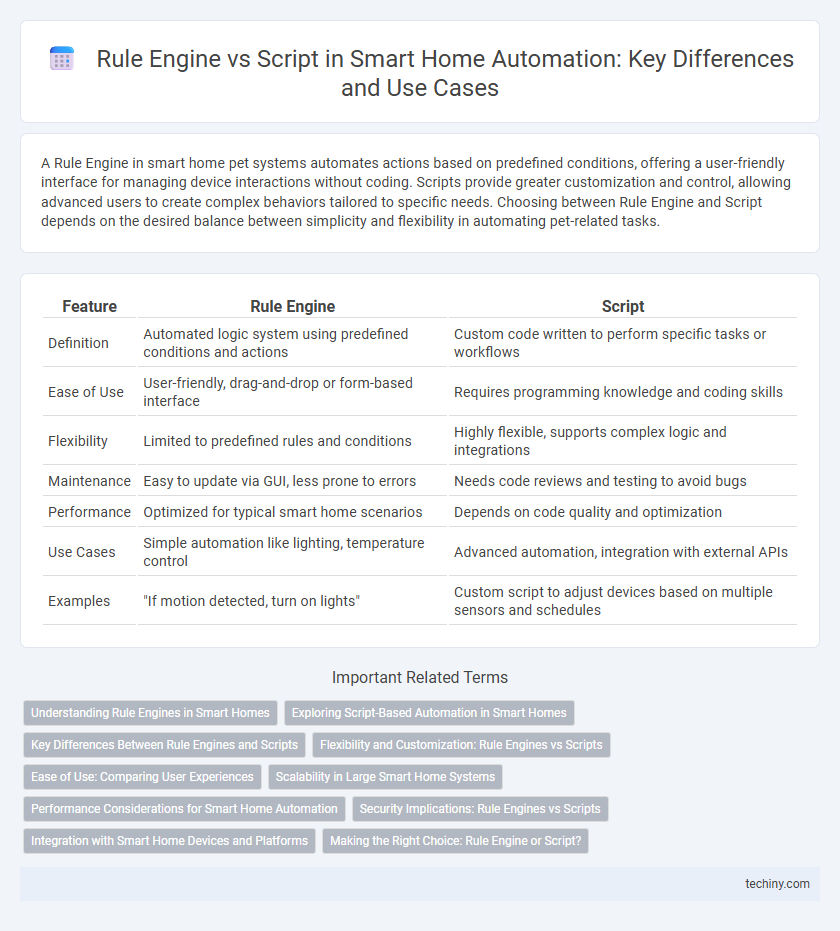A Rule Engine in smart home pet systems automates actions based on predefined conditions, offering a user-friendly interface for managing device interactions without coding. Scripts provide greater customization and control, allowing advanced users to create complex behaviors tailored to specific needs. Choosing between Rule Engine and Script depends on the desired balance between simplicity and flexibility in automating pet-related tasks.
Table of Comparison
| Feature | Rule Engine | Script |
|---|---|---|
| Definition | Automated logic system using predefined conditions and actions | Custom code written to perform specific tasks or workflows |
| Ease of Use | User-friendly, drag-and-drop or form-based interface | Requires programming knowledge and coding skills |
| Flexibility | Limited to predefined rules and conditions | Highly flexible, supports complex logic and integrations |
| Maintenance | Easy to update via GUI, less prone to errors | Needs code reviews and testing to avoid bugs |
| Performance | Optimized for typical smart home scenarios | Depends on code quality and optimization |
| Use Cases | Simple automation like lighting, temperature control | Advanced automation, integration with external APIs |
| Examples | "If motion detected, turn on lights" | Custom script to adjust devices based on multiple sensors and schedules |
Understanding Rule Engines in Smart Homes
Rule engines in smart homes automate device behaviors by processing predefined conditions and triggers, enabling seamless interaction without manual input. Unlike scripts that require coding skills and manual updates, rule engines use user-friendly interfaces to create dynamic, context-aware automations. This enhances smart home efficiency by allowing real-time adjustments based on sensor data, user preferences, and environmental changes.
Exploring Script-Based Automation in Smart Homes
Script-based automation in smart homes offers granular control by enabling customized sequences of device actions, surpassing the fixed conditions and triggers typical of rule engines. Advanced scripting languages such as Python and JavaScript allow for integration with diverse smart devices and cloud services, enhancing flexibility and scalability. This approach supports dynamic environments where user preferences and external data continuously evolve, ensuring responsive and personalized automation experiences.
Key Differences Between Rule Engines and Scripts
Rule engines in smart homes enable automated decision-making through predefined logical conditions and triggers, offering scalability and ease of management for complex automation scenarios. Scripts provide granular control by executing specific sequences of commands, ideal for custom or one-off tasks but require manual updates for changes. Rule engines optimize efficiency by handling multiple conditions dynamically, whereas scripts are static and dependent on explicit coding for each action.
Flexibility and Customization: Rule Engines vs Scripts
Rule engines offer predefined logic structures and user-friendly interfaces that simplify automation setup but may limit advanced customization. Scripts provide extensive flexibility by allowing developers to write complex, tailored behaviors and conditional flows beyond standard rule capabilities. Choosing between rule engines and scripts depends on the balance between ease of use and the need for deep customization in smart home automation.
Ease of Use: Comparing User Experiences
Rule engines in smart homes offer intuitive interfaces that enable users to create automation through simple drag-and-drop actions, making them accessible to non-technical users. Scripts require coding knowledge, presenting a steeper learning curve but allowing for highly customized automation scenarios. User experience favors rule engines for ease of use, while scripts appeal to advanced users needing flexibility and control.
Scalability in Large Smart Home Systems
Rule engines offer superior scalability in large smart home systems by efficiently managing numerous automation rules through centralized processing and optimized conflict resolution. Scripts can become complex and harder to maintain as the number of devices and interactions grows, leading to performance bottlenecks and increased troubleshooting time. Leveraging a rule engine enhances system responsiveness and reliability, especially when integrating diverse devices and handling dynamic, large-scale environments.
Performance Considerations for Smart Home Automation
Rule engines in smart home automation prioritize optimization through pre-defined conditions and event triggers, enabling faster response times and reduced processing overhead compared to scripts. Scripts offer greater flexibility but often consume more system resources and introduce latency due to sequential execution and complex logic handling. Effective performance in smart home systems relies on choosing rule engines for time-critical tasks and reserving scripting for advanced customizations.
Security Implications: Rule Engines vs Scripts
Rule engines in smart homes offer predefined, standardized security protocols that reduce the risk of vulnerabilities caused by coding errors, enhancing overall system reliability. Scripts, while flexible and customizable, can introduce potential security flaws due to manual coding mistakes or inadequate testing, increasing the risk of unauthorized access or system breaches. Employing rule engines minimizes security risks by enforcing consistent policy application, whereas scripts demand rigorous security auditing to prevent exploitation.
Integration with Smart Home Devices and Platforms
Rule engines offer seamless integration with a wide range of smart home devices and platforms through predefined templates and standardized protocols like Zigbee, Z-Wave, and MQTT, enabling automated, event-driven responses without extensive coding. Scripts provide granular control and customization by allowing users to write specific commands for device interaction, ideal for complex scenarios that rule engines may not support but requiring more technical expertise. Both solutions enhance smart home interoperability, with rule engines prioritizing ease of use and scripts maximizing flexibility for diverse device ecosystems.
Making the Right Choice: Rule Engine or Script?
Choosing between a rule engine and a script in smart home automation depends on the complexity and flexibility required. Rule engines offer intuitive, user-friendly interfaces with pre-built logic for common scenarios, enabling faster setup and easier maintenance. Scripts provide granular control and customization, ideal for advanced users who need tailored automation beyond standard rules.
Rule Engine vs Script Infographic

 techiny.com
techiny.com